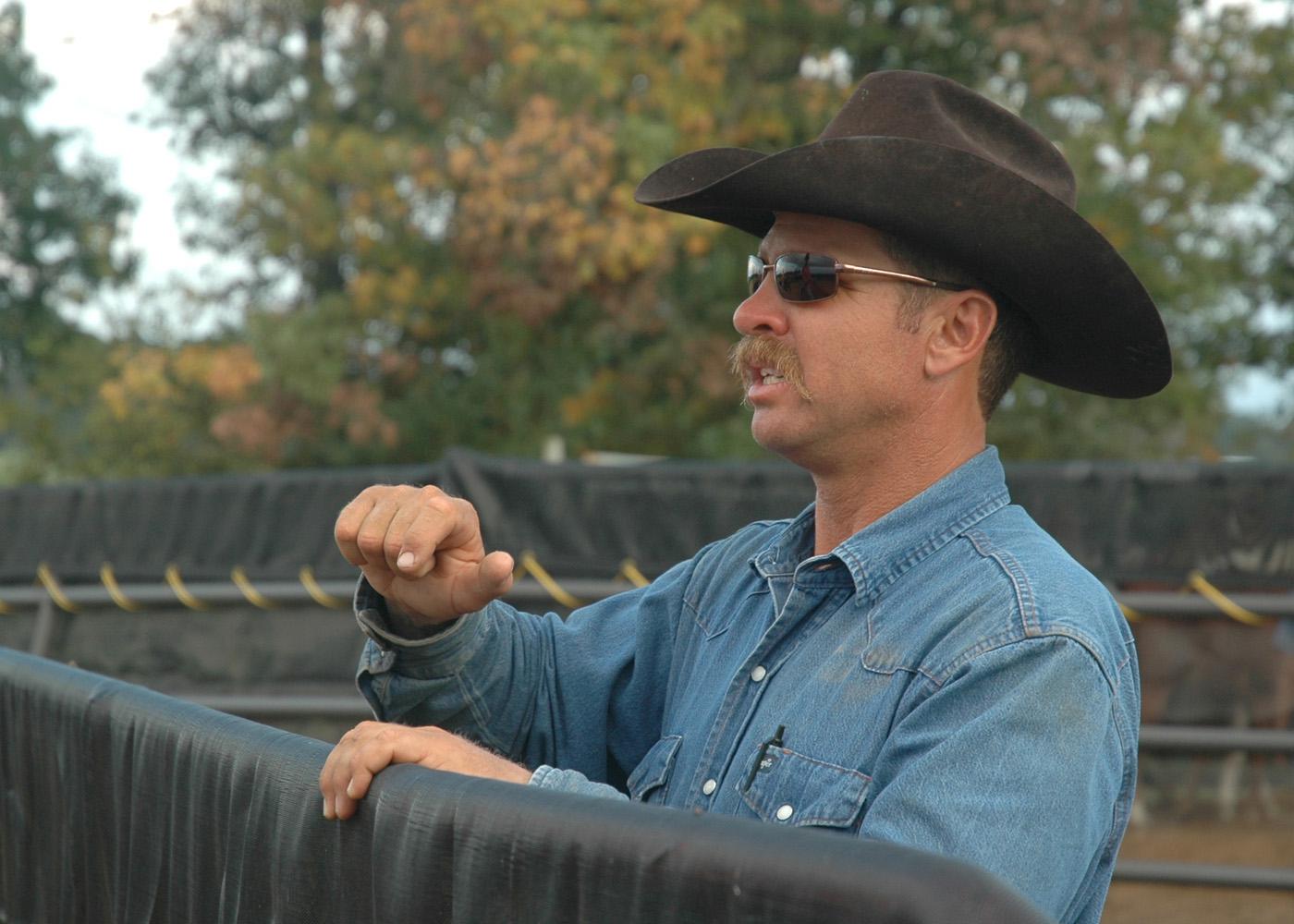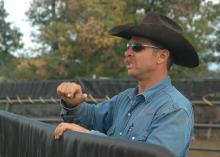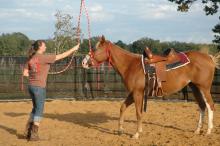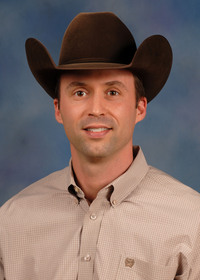Information Possibly Outdated
The information presented on this page was originally released on November 1, 2007. It may not be outdated, but please search our site for more current information. If you plan to quote or reference this information in a publication, please check with the Extension specialist or author before proceeding.
MSU students learn horsemanship skills
MISSISSIPPI STATE -- No matter how much they thought they knew, the two- and four-legged students in Peter Ryan's new “special topic” class are learning a lot.
The class, Equine Behavior Modification, is giving 15 students the opportunity to learn how to break horses without breaking themselves. The horses -- as untamed as rarely handled cattle -- are learning that people are more trustworthy than they originally suspected.
“The students are practicing the quiet approach to breaking a horse,” Ryan said. “This isn't like the movies where a person jumps on a horse and hangs on until it quits bucking. They slowly help the horses progress from simple handling with a halter to blankets, saddles, weight and bridles.”
The new class was born out of necessity after a donation of 66 untamed horses to the university. Additional horses from MSU are included in the training. The university will eventually sell the horses to support equine research.
“This is a win-win-win situation. The students gain a lot of valuable experience, the horses are trained gently, and they will be worth more when it is time to sell them. Buyers also will be able to know what they are getting,” Ryan said.
The class is the brainchild of Ryan and Preston Buff, equine specialist with MSU's Extension Service. They enlisted additional instructional assistance from Michael Freely, a local horse trainer.
“My goal for these students is for them to learn how to think and to work on themselves, not just the horses. Mistakes are never the horse's fault,” Freely said. “But when we are finished, none of these students will have learned as much as I have.”
Freely said the students are laying a good educational foundation for each of these horses and their future owners. Along the way, he is trying to pass on his philosophy of horsemanship.
“People need to learn to accept what each horse is -- some will be speed-event horses, some will be quiet enough for beginners, some will always need more experienced riders,” Freely said. “Nothing is wrong with any of those situations. The problems come when we try to make horses something they are not.”
Freely said the key to the students' success is the hands-on opportunity to work with a wide variety of horses.
“The students could stand out here and watch me train horses all day, but they wouldn't learn as much,” he said.
In addition to time spent with the horses, students are keeping daily journals of the activity and progress made with their assigned horses. They will write a term paper on some aspect of horse management and/or production to complete the course requirements.
Shanna Lee of Poplarville is a senior in animal and dairy sciences hoping to pursue a degree in veterinary medicine. She has been breaking horses with her father most of her life.
“The class has reinforced things we've done right, and I've learned new training methods as well,” Lee said. “Safety is a big part of this class. For one, we only ride with helmets. I've also learned safer ways to saddle and mount a horse. We have all learned the value of patience.”
Lee said she plans to incorporate much of what she has learned when she works with her own horses.
“We've been working with young horses, which spook more easily. You have to pay attention all the time and never let your guard down,” Lee said. “Horses have a way of reminding you what you should be doing. They will humble you fast.”
This class is similar to another class for MSU weanlings that has been offered the last several fall semesters. These foals, born on the university's farm the previous spring, are too young to ride until they are about 2 years old.
“Students not only halter break the weanlings, they also get them accustomed to ropes, water hoses, bathing, blankets, spray bottles and trailer loading,” said Molly Nicodemus, assistant professor of animal and dairy sciences.
The public can see some of the horses and students involved in these classes during the university's upcoming horse sale beginning at 1 p.m. Nov. 17. The Mississippi Agricultural and Forestry Experiment Station and MSU's Department of Animal and Dairy Sciences will host the sale at the Mississippi Horse Park, which is located on Poorhouse Road south of Starkville. For more information on the sale, contact the ADS department at (662) 325-2802.
Contact: Dr. Peter Ryan, (662) 325-2938
Your Extension Experts
Related News
Pages
Related Publications
Pages
- « first
- ‹ previous
- 1
- 2
- 3
- 4





